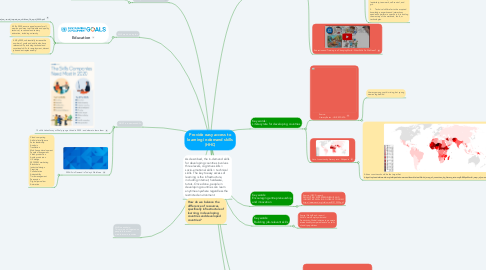
1. Leading SDG 4 - Education 2030
1.1. Education 2030: Incheon Declaration and Framework for Action for the implementation of Sustainable Development Goal 4: Ensure inclusive and equitable quality education and promote lifelong learning opportunities for all https://unesdoc.unesco.org/ark:/48223/pf0000245656
2. WHO needs help: This project will targeted on people in low- and middle-income countries
3. WHY are do doing this
3.1. Education
3.1.1. Policy Brief: The Impact of COVID-19 on children https://www.un.org/sites/un2.un.org/files/policy_brief_on_covid_impact_on_children_16_april_2020.pdf
3.1.2. 4.3 By 2030, ensure equal access for all women and men to affordable and quality technical, vocational and tertiary education, including university
3.1.3. 4.4 By 2030, substantially increase the number of youth and adults who have relevant skills, including technical and vocational skills, for employment, decent jobs and entrepreneurship
4. WHAT is in-demand skills:
4.1. 15 skills LinkedIn say will help you get hired in 2020 - and where to learn them
4.2. 20 Skills in Demand in Today's Workforce
4.2.1. Cloud computing Artificial intelligence Sales leadership Analysis Translation Mobile app development People management Video production Audio production UX design SEO/SEM marketing Blockchain Industrial design Creativity Collaboration Adaptability Time management Persuasion Digital journalism Animation
5. As described, the in-demand skills for developing countries involves three levels, cognitive skills > socio-emotional skills > technical skills. The key to easy access of learning is the infrastructure, including internet, hardware, tutors. Once done, people in developing countries can learn anytime anywhere regardless the restricted environment.
6. How do we balance the difference of resources, specifically infrastructure of learning, in developing countries and developed countries?
7. Key words: Infrastructure for learning in developing countries
7.1. Source (article): Review of E-Learning and ICT Infrastructure in Developing Countries (Case Study of Iran) https://www.researchgate.net/publication/285626353_Review_of_E-Learning_and_ICT_Infrastructure_in_Developing_Countries_Case_Study_of_Iran
7.1.1. Three pillars of smart school including education, ICT and e-learning have been introduced. The smart school is a learning institution that has been systemically reinvented in terms of teaching-learning practices and school management in order to prepare children for the Information Age. ICT, as second pillar of smart school, has many roles to play in a smart school, from facilitating teaching and learning activities to assisting with school management.
7.1.1.1. Key words: Information and Communication Technology (ICT)
8. Key words: Facilitating labor mobility and job matching
8.1. Source: STEP Skills Measurement Surveys : Innovative Tools for Assessing Skills
9. Key words: Encouraging entrepreneurship and innovation
9.1. Source: (OECD report) PROMOTING ENTREPRENEURSHIP AND INNOVATIVE SMEs IN A GLOBAL ECONOMY https://www.oecd.org/cfe/smes/31919590.pdf
10. Key words: In-demand skills in developing countries
10.1. Source (website): The World Bank Skills Development
10.1.1. More than two billion working-age adults are not equipped with the most essential literacy skills required by employers. Among young adults under the age of 25, the number is about 420 million worldwide.
10.1.2. Foundational skills, such as literacy, provide critical scaffolding for young people and are a prerequisite for numeracy, problem solving, and socio-emotional skills. Helping young people develop these skills makes economic sense. Unskilled workers are forced into unemployment or are stuck in unstable low-wage jobs that offer little career mobility or growth. As they age, they become increasingly vulnerable to job losses and labor market shocks.
10.1.3. 1. Cognitive skills include literacy and numeracy. They refer to the ability to understand complex ideas, adapt effectively to the environment, learn from experience, and reason. 2. Socio-emotional skills refer to the ability to navigate interpersonal and social situations effectively and include leadership, teamwork, self-control, and grit. 3. Technical skills refer to the acquired knowledge, expertise and interactions needed to perform a specific job, including the mastery of the materials, tools, or technologies.
10.2. Education and Training in a Changing World: What Skills Do We Need?
11. Key words: Literacy rate for developing countries
11.1. Source: Literacy Rates - UNICEF DATA
11.1.1. Literacy among youth is rising, but young women lag behind
11.2. List of countries by literacy rate - Wikipedia
11.2.1. African countries should be the target first https://upload.wikimedia.org/wikipedia/commons/thumb/a/ae/World_map_of_countries_by_literacy_rate.svg/2880px-World_map_of_countries_by_literacy_rate.svg.png
